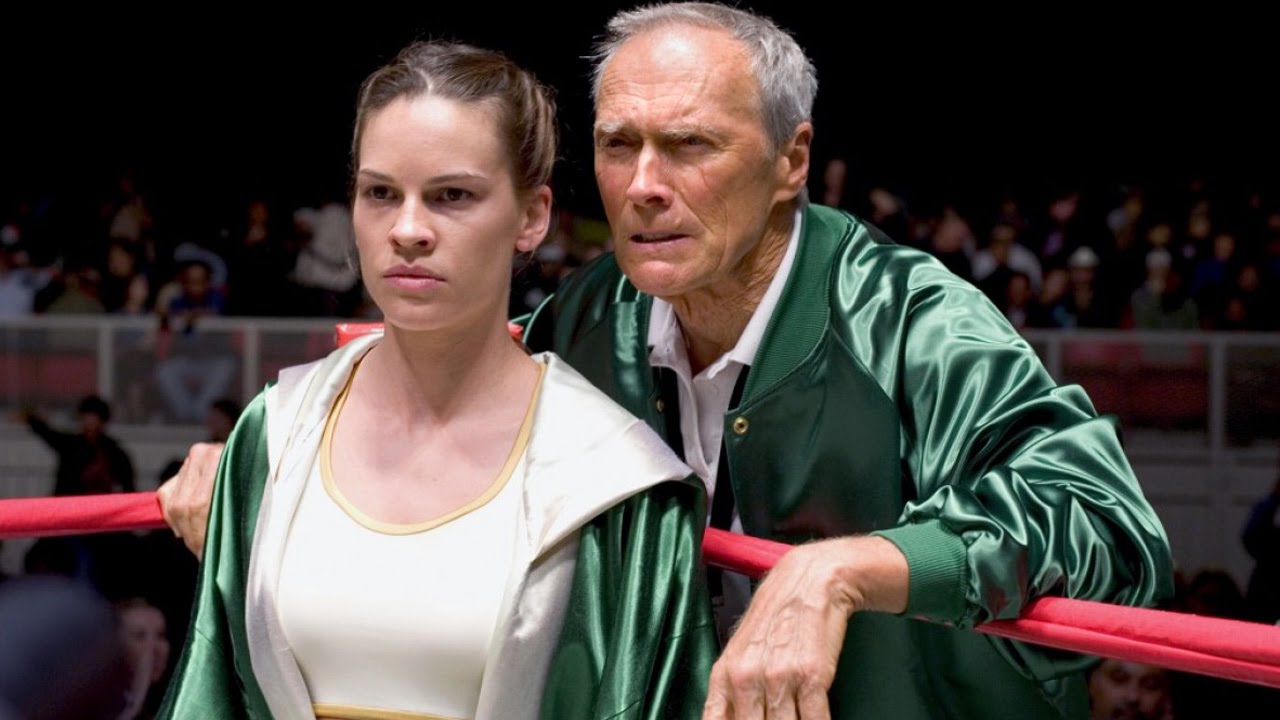
The things we say when we think we can predict the future. If there is any true expression in life, it’s ‘never say never.’ Clint Eastwood said at one time that he would never win an Oscar because A. He wasn’t Jewish, B. He made too much too money, and most importantly, C. He doesn’t give a fuck.
You can bet your ass he was wrong. When looking at his stunning array of awards, it seems than an Oscar nomination has become a natural occurrence in his life. He’s no longer the kid from “Rawhide,” no longer the eager tutor of Sergio Leone and Don Siegel, and no longer the sexy 70’s action star. He’s a serious filmmaker, one of the best in the business, who at the fragile age of 87 is still going goddamn strong.
If one were to sum up Eastwood’s career, the fact that he really didn’t give a fuck would be a good start. He does what he wants to do. He makes the films the films he wants to make and has little problem finding funding. Not every filmmaker is that blessed. He doesn’t care to follow conventions and has long stopped caring about the money. If you’re still working at his age, it’s because you care about the art of filmmaking.
Or perhaps he just wanted to defy the notion that he’s past his prime. He’s a stubborn old man, he doesn’t like to listen to reason. He’s made a few of his greatest movies in the winter of his career and there’s no sign of him stopping anytime soon. It’s like he said: ”There’s a rebel lying deep in my soul. Anybody tells me the trend is such and such, I go the opposite direction.”
You live so long and some things stay and some things wear out. But as long as you got the grit, you can’t stop living. And never be afraid, no matter how old you are, to try new things. You don’t have to be as tough as Eastwood. You just gotta go for it. As Eastwood would say: ”Let’s not ruin it by thinking too much.”
There’s the dying of the light, we all know it’s coming. We fear the headline news as we switch on our morning news feed. ”Please don’t take anyone of my heroes,” we say to ourselves. It’s a morbid subject to bring up, but knowing his age and remembering the cinematic heroes we’ve lost recently, it’s bound to happen. We don’t know, he might outlive us all. But just like Mel Brooks, we might have Eastwood still among us, well into his 90s, with more spirit and grit than anyone ever had in their lifetime.
Eastwood is a legendary name in Hollywood history. It’s the mark of absolute artistry, of pure cinema. He’s one of the reasons we’ve come to love the medium so much. It’s just like how cinematic connoisseurs get excited when they see the name of Spielberg, Coen or Scorsese on a movie poster. Writing this article had been arduous task, as I greatly underestimated the scope of his filmography – not to mention its incredible diversity. But it’s been a grateful project as I’ve learned not only to appreciate him more, but after reviewing and revisiting all of his films, I can only conclude that he’s one of the greatest directors of our time. He has become one of my favorites.
Ranking all of these films wasn’t easy either. Many of them I love for different reasons. Not all of them are masterpieces, but none of them deserve to be called ‘bad films.’ They all have that undeniable quality Eastwood is guaranteed to deliver.
I keep wondering what his secret is. How does he manage to do it? How does he switch so effortlessly between genres? How does he so infamously finish many of these films under budget and ahead of schedule? How does he keep surprising us time and again? The only answer I can think off, is the one Eastwood gave us, ”let’s not ruin it by thinking too much.”
37. The Gauntlet
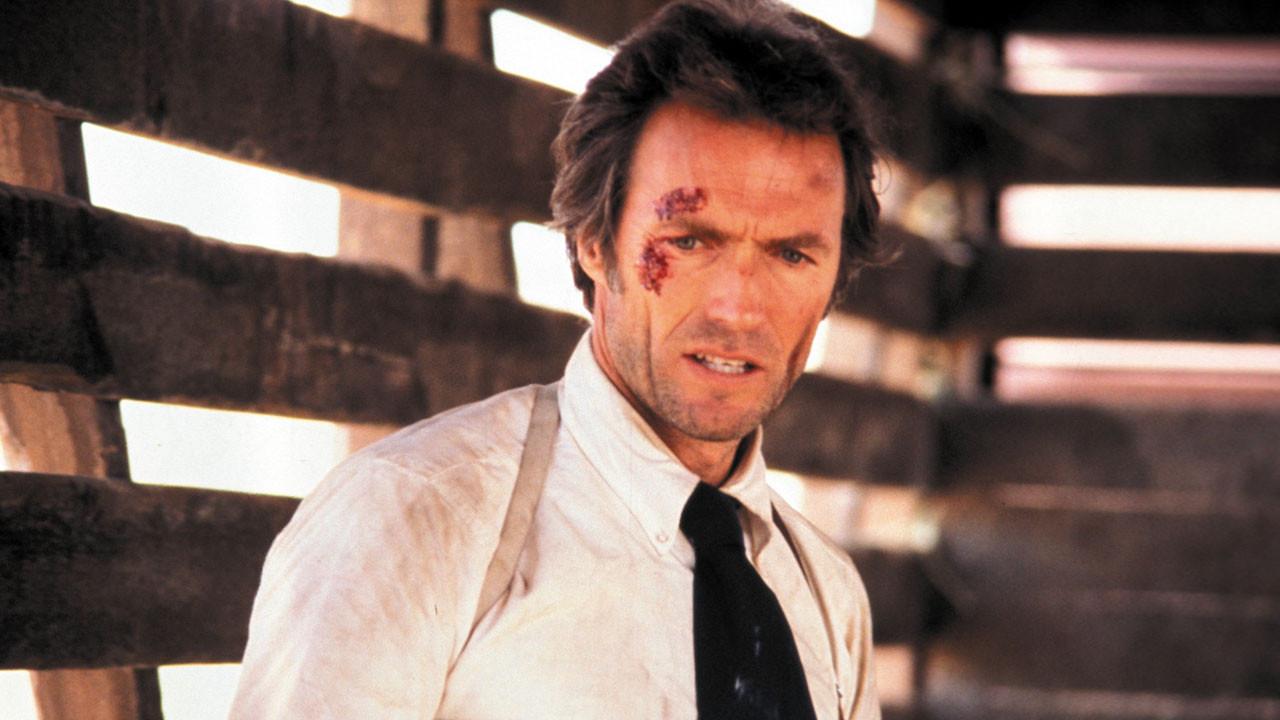
The relationship between Eastwood and Sondra Locke was one of trial and tribulations that ended rather bleakly. There was deceit. Even though he reportedly had told her that he didn’t want any children, he had secretly fathered two children during their relationship. Locke eventually sued Eastwood for palimony and this legal battle lasted almost a year until Locke eventually dropped the suit.
The reason for her dropping the suit is shocking in itself: Eastwood had made up a false settlement, which stated that she would receive a lucrative film deal with Warner Brothers if she would drop the suit. When she came to Warner Brothers to work something out, she discovered they had no interest in any of her ideas. She then sued both Eastwood and Warner Brothers, which ended with a hefty settlement in both cases.
In reading this, you do get a different perspective on Eastwood. You want your cinematic heroes to be similar in real life. But Eastwood is only human, just like the rest of us. Eastwood’s earlier life was filled with the typical pratfalls of celebrity, one of them being the development of a giant ego. This is especially common among action stars, and the lives of Sylvester Stallone or Burt Reynolds are more examples of this. This film was one of six films he made with Locke, and though it’s certainly not as bad as “Pink Cadillac,” it’s certainly one of his weaker films.
The premise is very simple: Eastwood plays Shockley, an alcoholic cop sent out to protect a foul-mouthed escort, Augustina (Locke), from Phoenix to Las Vegas as she’s supposedly a witness to a minor case. But along the way, they are being chased down by professional assassins. Shockley rightly suspects that Augustina is a witness to something far more pressing and that there’s a larger conspiracy at play. As they escape death numerous times, they naturally fall in love.
The project had received the interest of Sam Peckinpah and Walter Hill and honestly, it feels more like their style of film. Eastwood doesn’t give the film enough pulp sensibility to make it really fun. The lead characters, despite their the actors’ real love life, don’t really simmer on screen – they would fare better in “Bronco Billy.” We know where it’s heading, every now and then there’s a hail of bullets, but it just isn’t enough to make it truly memorable.
36. The Eiger Sanction
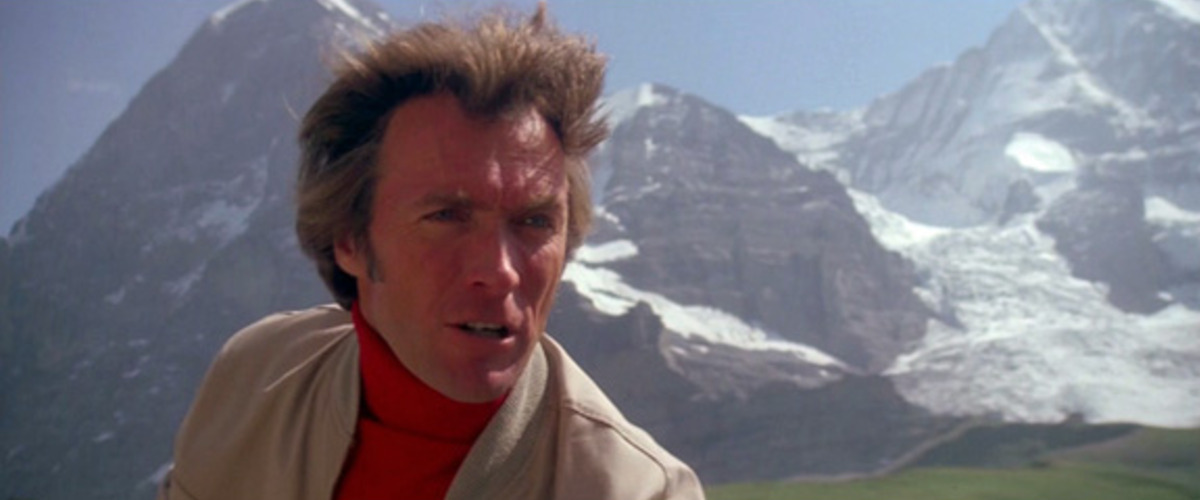
In this film, Eastwood plays a college art professor named Jack Hemlock. It’s hard picturing Eastwood as a college professor but there he is, donned in your unassuming tweed jacket and big rimmed glasses. This being 1975, the height of Eastwood’s magnetism, we can see an attractive student ogling him during class. After he’s done teaching his class, this attractive student comes into his office, offering sexual favors in order to pass his class. Hemlock naturally rejects the offer, but does send her out the door by telling her to study and spanking her ass for good measure – good old 70s!
But don’t worry, Eastwood is not playing some libtard college professor – he’s actually a retired CIA assassin who is called back into the agency to do one more job. Hemlock aggressively refuses, kicking out the operative who came into his office to bring him in. But Hemlock’s former director, Mr. Dragon (Thayer David), a total albino who cannot stand the smallest exposure to sunlight and needs daily medical care, blackmails Hemlock into returning by threatening to report his precious art collection to the IRS – a collection he financed by the hit jobs (or ‘sanctions’ as they are called in this movie) he performed for the government.
Hemlock does negotiate a nifty deal for himself: $20,000 extra, plus a letter from the IRS, guaranteeing that they can never hassle him for owning his priceless artifacts. Hemlock first agrees to do one job: the death of one of the two men who killed a government operative. But through a series of circumstances he agrees to kill the second assailant, since he’s the only right man for the job. Why? Because it involves mountain climbing, something Hemlock used to be very adept at.
The job is also personal as Mr. Dragon informs Hemlock that the murdered operative was an old friend who had once saved saved his life. The biggest problem, however, is that he must climb the Eiger mountain, which in his past climbing expeditions had nearly killed him twice…
“The Eiger Sanction” is a straightforward spy-thriller that isn’t going to amaze you, but does have a fair amount of things to recommend about it. The cinematography is great, especially during the climatic climbing sequences, the definitive highlight of the film (it also helps that Eastwood does a fair amount of his own stunts). There’s the score by John Williams that is both dark and adventurous, two perfect set of moods for this very film. The supporting cast is very entertaining, especially David as the insidious Mr. Dragon and George Kennedy as Hemlock’s friend and climbing instructor.
Overall, the film isn’t very memorable, but is entertaining throughout. The fight sequences are reminiscent of the time, meaning that they are rather clumsy, but the climbing sequences are certainly impressive for the time and still look beautiful today. It’s not essential Eastwood watching, but not a bad way to spend your time.
35. Firefox
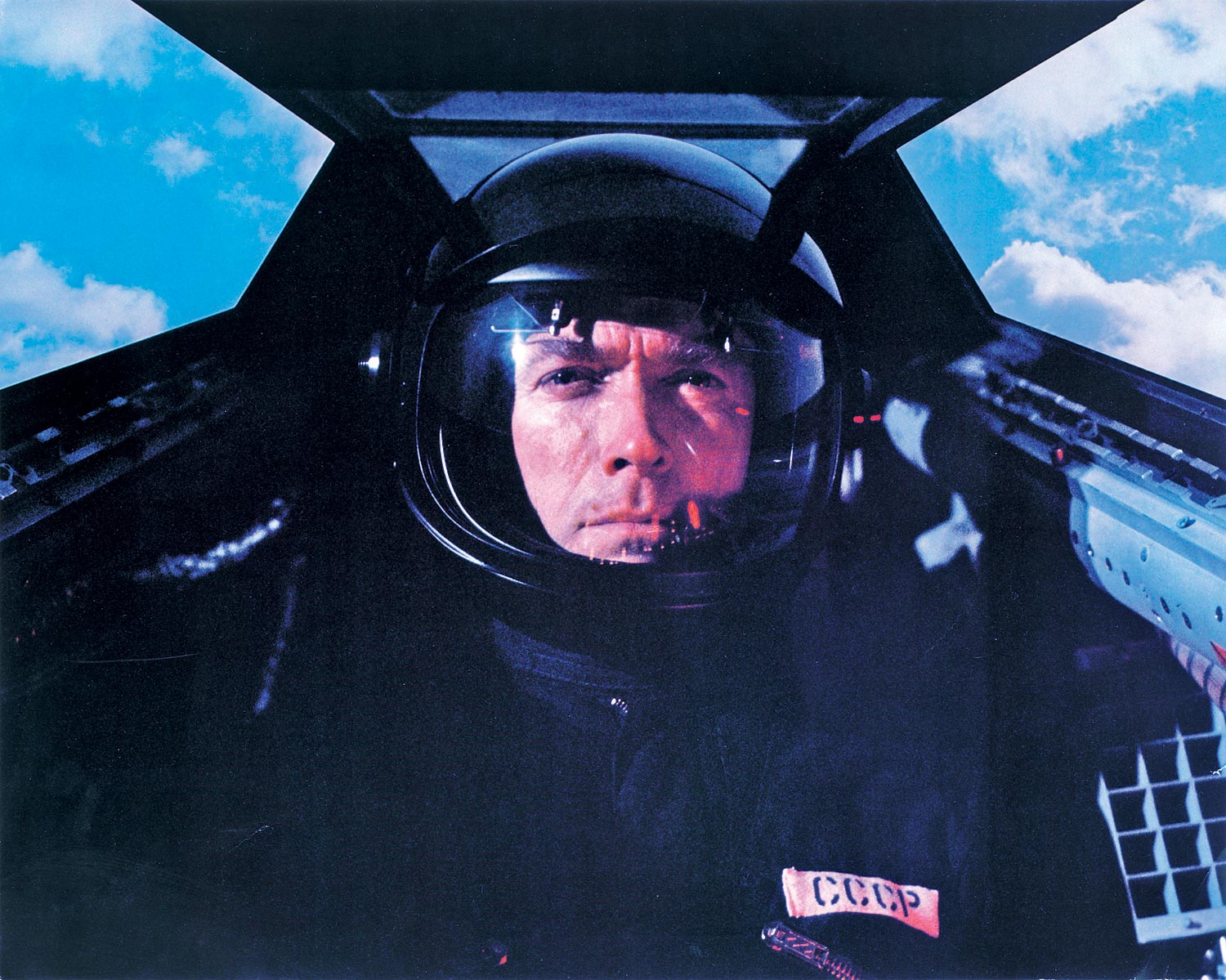
“Firefox” is a glorious, albeit ridiculous product of the Cold War. The Russians are the bad guys, the hero is a patriotic American. Luckily the film doesn’t venture into Reaganite propaganda; it’s simply a fun, albeit sometimes stupid action film. It could have starred any number of 80’s action heroes, but has a certain added class to it due to the hero of the film being played by Eastwood himself.
The central hero is not a dumb action jock, he’s a Vietnam veteran who is still traumatized by his many ugly experiences there. Eastwood plays this straight and you do believe his internal struggle. It sometimes feels like his character would have been better served in a less goofier plot, but this is the one we got: a former United States Air Force major by the name of Mitchell Gant (Eastwood) must venture into Russia to steal a Soviet aircraft by the name of Firefox. This aircraft can fly undetected by radar and its weaponry can be unleashed by the power of the mind – yes, a bit more science fiction than what you usually can expect from Eastwood.
The basics of the mission is explained clearly to our protagonist and to the audience within the 10-minute mark. Eastwood is smart enough not to let the scientists speak too much mumbo-jumbo and the plot quickly begins. The quick pace works to the film’s favor. The film is almost like an 80’s “Mission: Impossible” film starring Eastwood, who admittedly plays a much more interesting character than Tom Cruise as Ethan Hunt.
“Firefox” is unpretentious fluff and often dismissed among Eastwood’s classier works. It’s certainly not a great film and the final flying scenes are a bit laughable. Nevertheless it’s worth a watch for any fan of Eastwood and should be enjoyed as pure enjoyable schlock.
34. Sudden Impact
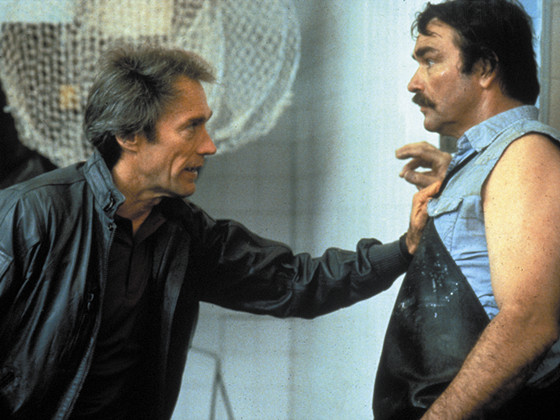
This is the fourth film of the Dirty Harry franchise and as you can expect, it doesn’t really break any new ground. It’s certainly not the best film of the franchise, which will always be reserved for the first one, but it’s certainly better than “The Dead Pool” – and thank god this film doesn’t have a sequence involving a remote control car with a bomb attached to it. The film does keep itself a bit more grounded, retaining some of the grittiness that went away when Harry Callahan had a rocket-launcher battle in the preceding film “The Enforcer.”
The film’s central villain (though that can be debated) is also more interesting: Jennifer Spencer, played by Eastwood’s former lover Sondra Locke. She plays a former victim of a gang rape that included her sister and years later, she’s systematically murdering every one of them. Naturally, Dirty Harry is on the case.
There’s a change of pace in the series with Harry showing more empathy toward the villain of the piece. Locke does a solid job here and you are actually rooting for her to succeed. It might be the second best Dirty Harry film, solely because of her character alone.
33. Tightrope
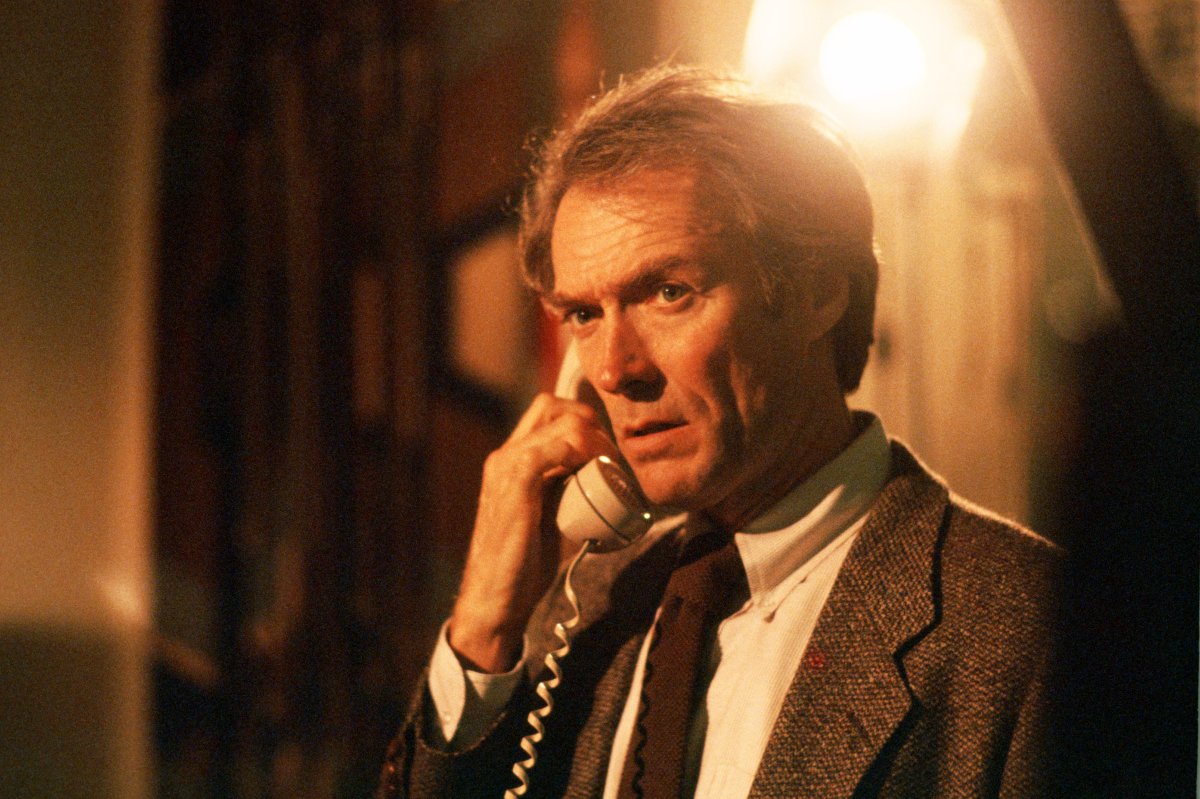
Tightrope is one of Eastwood’s more oddball directed films. Even though it’s credited as being directed by Richard Tuggle, it’s Eastwood who eventually took over filming after he became annoyed with Tuggle’s slow directing.
The film itself has Eastwood playing detective Wes Block, who is chasing a serial killer who likes to strangle prostitutes. It all sounds like standard stuff but there’s a deeper character play here: it’s as much about Wes Block’s own feelings toward women as it his about his chase of the serial killer. He is forced to work together with Beryl (Genevieve Bujold), a hardcore feminist, and over the course of the film’s journey, Block’s attitudes toward women begin to change.
Confronting senseless machismo and the treatment of women that comes after it is interesting, even though Eastwood had reportedly numerous affairs with women during filming. Unfortunately the film doesn’t delve quite deep enough to make it a compelling character piece, which is the strongest aspect of the film. We’ve seen the serial killer chase numerous times before, especially from Eastwood. The final confrontation is also a bit of letdown. But it’s at least more interesting than another derivative Dirty Harry sequel.
32. Blood Work

One of Eastwood’s more maligned works, “Blood Work” still has all the hallmarks of an entertaining Eastwood flick even if it’s one of his minor work. Based on Michael Connelly’s novel, this is the story of FBI agent Terry McCaleb, who suffers a heart attack while chasing a serial killer. He receives a heart transplant from a murdered victim and he feels a sense of guilt as he goes into retirement. When the sister of one of the murdered victims pleads for his help, he feels compelled to return to the case in order to find closure.
As you can expect from an Eastwood film, it’s about the individual, who defies all the forces in order to rise to the challenge. People all around him remind him he’s unwell, that he’s old and doesn’t have it anymore. He should do the smart thing and finish the rest of his retirement peacefully. Eastwood, being the badass he is, refuses to do so. There is excellent supporting cast, from the always reliable Anjelica Huston as McCaleb’s physician Dr. Bonnie Fox and especially Jeff Daniels as Buddy Noone, McCaleb’s eccentric neighbor.
The film misses that sense of urgency and suspense from his other thrillers, as well as that lean pacing which makes Eastwood’s films usually such a breeze. Nonetheless, you could do worse than a middling Eastwood film.
31. Hereafter
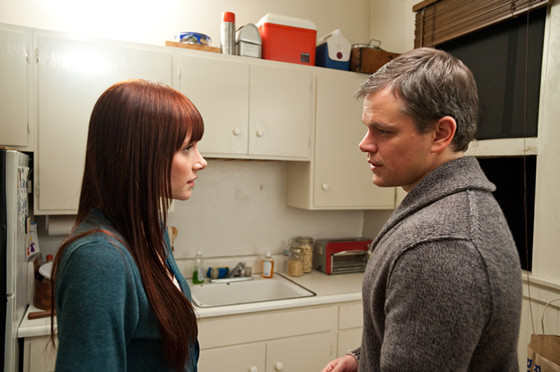
“Hereafter” is another one of those unpredictable Eastwood projects. It’s a supernatural drama concerning itself with the possibility of life after death, something you wouldn’t normally associate with Eastwood. When I first heard about this and saw the trailer, I began to fear that Eastwood was going to get all New Age on us.
Regardless of how brilliant an artist is, they can still have some embarrassing opinions concerning the cosmic nature of things. Luckily, the film never goes too far; it’s playing with ideas instead of giving any definitive answers. Eastwood isn’t falling for all of that fake psychic shit. As Eastwood himself stated about this film: “I don’t have the answer. Maybe there is a hereafter, but I don’t know, so I approach it by not knowing. I just tell the story.”
The film details three stories: Frank (Matt Damon), a retired psychic who considers his gift a curse; Marie (Cecile de France), an upper-class television journalist who begins to the ponder the possibility of an afterlife after a near-death experience; and Marcus, a 12-year-old boy who desperately wants to seek contact with his dead twin brother, Jason (roles alternately played by both Frankie and George McLaren).
The script has a few problems. Some of the supporting characters seem to be there to only serve the story and give the main characters some conflict. There’s the skeptical and pompous husband of Marie, whose coldness toward her after what she endured is a little unbelievable.
The romantic subplot that happens between Frank and Melanie (Bryce Dallas Howard) feels a little forced, though the scene where they begin to confide in each other, which takes place in a cooking class during a tasting session and is accompanied by a wonderful rendition of “Nessun Dorma,” does work well. Despite these flaws, it all comes together satisfactorily and when the dramatic moments work, they really do work.
The tsunami scene in the beginning is also extremely well done. You feel the disorientation and panic that Marie feels as she’s being carried away by the violent waves. It’s a stand-outs sequence and probably the most memorable one.
Ultimately the film itself is not a very memorable. It’s a well told story but doesn’t have many new or interesting things to say. It’s admirable that Eastwood tackles the subject of the afterlife, but you wish there was more there; not necessarily more answers, but perhaps more prodding questions or a closer scientific look would have been interesting. Eastwood nevertheless makes the film work and makes it engaging while it lasts, even if you forget it about quickly after.
30. Breezy
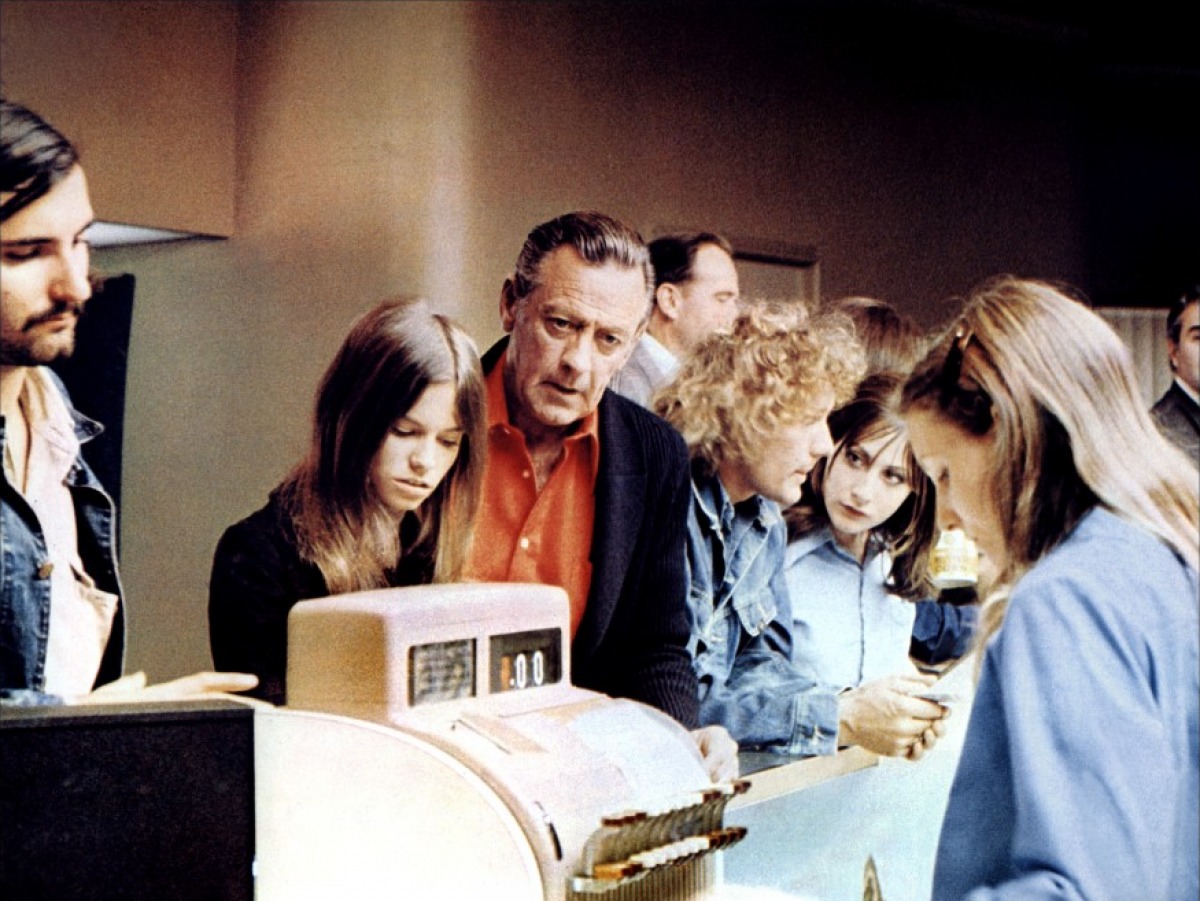
This is the story of a love affair between a young woman and a much older man. The young woman in question is Breezy (Kay Lenz), the title character. She’s a hippie with a motormouth and no job, who lives on the kindness of strangers, though this kindness sometimes turns into exploitation. Frank Harmon (William Holden) is the older man who lives in a nice house and has steady income, but just like Breezy, has no romantic attachments as Frank prefers to meet other women with no strings attached.
Through chance or fate they bump into each other. Frank at first just wants to get rid of her, considering her immature and being afraid that she will take advantage of him. But Breezy’s forward ways and warm smile becomes irresistible and eventually he lets her stay in his house. Though he has fallen for her, he refuses to give into his desires, finding that their age difference would make it impossible and doomed to fail.
The emotionally detached older man meeting a flirtatious and promiscuous woman makes it sound like this a Philip Roth novel. In some way you could consider this as Eastwood adapting a Philip Roth novel, though if it was a Philip Roth tale, the older male would have long given into his desires. It’s full of dialog concerning the meaning of relationships, the clash between age and youth, expectations and reality.
In this day and age, this might be derided as being a male fantasy film. Breezy as a character sometimes feels like that, but to dismiss her as such would be unfair. Breezy’s appeal to Frank is not her youth or attractiveness; to him it’s actually a detriment. It’s in the way she makes him appreciate his life, the way she opens him up from his protected shell.
Breezy gives love away freely, Frank is too emotionally distant from others, and holds back and only takes love. Breezy, especially being the constantly optimistic flower girl, stands for the sunshine in one’s life, getting out of your room and appreciating the world outside, hence why she asks Frank to take her to the beach. It’s in this very place where we see Frank beginning to become more laid back and happy.
“Breezy” is one of those unknown Eastwood films that deserves more attention. If the title character herself would have had more depth, it would have really helped the film. But as it stands, the irresistible charm of Lenz and the subdued and layered performance of Holden, as well as their fine chemistry, is enough to recommend this film.